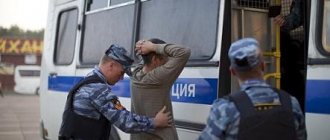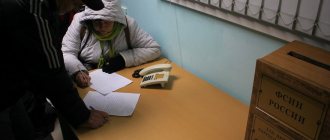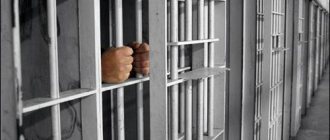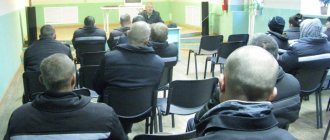Tasks and features of work
The Criminal Enforcement Inspectorate is a state body included in the structure of the Federal Penitentiary Service, subordinate to the Ministry of Justice of the Russian Federation. The main function of the institution is the implementation of convictions passed by courts against persons who have committed criminal acts.
Important! The main feature of the activities of the penitentiary institute is the proper implementation of punitive measures that do not imply isolation of convicts from society. Additionally, the inspectorate supervises citizens carrying out the corresponding punishment and monitors their compliance with court orders.
If we consider more specifically what the criminal executive authority does, its tasks are as follows:
- execution of punitive measures in the form of correctional or compulsory work;
- implementation of sanctions that deprive a person of the right to hold positions within certain areas or engage in certain activities;
- supervision of persons who have received a deferment of the execution of a court sentence if they are dependent on minors;
- the embodiment of such a sanction as restriction of freedom;
- checking the behavior of persons in respect of whom the execution of a court verdict has been suspended due to treatment for drug addiction;
- control of probationers.
Currently, there are more than 2,500 executive inspections operating within the country’s borders. Their division is made on the basis of territorial characteristics. The implementation of each specific punishment not related to imprisonment is carried out directly at the place of residence of the convicted person.
Article 54. Responsibilities of the criminal-executive inspection
- home
- Laws and regulations
- Criminal Executive Code of the Russian Federation
- Article 54. Responsibilities of the criminal-executive inspection
1. The criminal-executive inspection keeps records of those sentenced to punishment in the form of restriction of freedom, explains the procedure and conditions for serving the sentence, supervises the convicted and takes measures to prevent violations of the established procedure for serving the sentence on their part, provides assistance to convicts in finding employment, and conducts work with them educational work, applies incentives and penalties established by law, submits to the court proposals to partially cancel or supplement previously established restrictions for convicted persons, as well as to replace the unserved part of the sentence in the form of restriction of freedom with a punishment in the form of imprisonment for convicted persons evading serving a sentence .
1-1. In cases where a convicted person serving a sentence in the form of restriction of freedom, assigned as an additional type of punishment or when replacing the unserved part of a sentence in the form of imprisonment, is subject to administrative supervision in accordance with the legislation of the Russian Federation, the criminal executive inspection no later than two months before the expiration of the term of serving the restriction of freedom, informs the internal affairs body at the place of residence or stay of the convicted person about the expiration of such a period. (Part supplemented by Federal Law dated April 6, 2011 N 66-FZ) 2. The procedure for fulfilling the duties specified in part one of this article is determined by this Code, as well as by regulatory legal acts of the federal executive body exercising the functions of developing and implementing state policy and legal regulation in the field of execution of criminal penalties. (Article as amended by Federal Law dated December 27, 2009 N 377-FZ)
Commentary on Article 54
1. The commented article contains a list of the main responsibilities of the administration of correctional centers. It is entrusted with ensuring the established procedure and conditions for the execution (serving) of a sentence in the form of restriction of freedom from the moment the convicted person arrives at the correctional center until his release from it.
Upon arrival at the correctional center, the convicted person is registered, his rights and obligations, the procedure and conditions for serving the sentence are explained to him, and he is given an identity card, which must be kept by the convicted person at all times. The convict is brought to the attention of the internal regulations of the correctional center, about which he is taken to sign, he is warned about responsibility for violating the established procedure and conditions of serving the sentence.
With the assistance of local governments, the administration of the correctional center organizes the labor and living arrangements of those sentenced to restriction of freedom.
During the entire period of serving the sentence, the administration of the correctional center is responsible for ensuring compliance with the order and conditions of serving the sentence by convicts. To do this, it supervises convicts at their place of residence and work, conducts searches in the premises in which they live, conducts personal searches of them, seizes items and substances prohibited for acquisition, storage and use (Article 50 of the Penal Code of the Russian Federation), and in cases unauthorized absence of a convicted person at work or at his place of residence, organizes initial measures to establish the location and search for the convicted person.
The administration of the correctional center also carries out educational work with convicts, applies incentives and penalties established by law to them, and works to prepare them for release.
2. The procedure for fulfilling the listed and other duties by the administration of the correctional center is determined by the norms of Chapter. 8 of the Penal Code of the Russian Federation and regulatory legal acts adopted in their development.
Rights and responsibilities of the inspectorate
The activities of the penitentiary institute are fully regulated by the Criminal Executive Code of the Russian Federation. The list of responsibilities is disclosed in Art. 54 of the specified code of laws.
Inspectors are charged with the following responsibilities:
- Registration of citizens against whom a guilty verdict has been passed and punitive measures imposed.
- Familiarization of convicted persons with the regulations for serving their sentences. Explanation of the accompanying conditions and requirements for behavior during the period of its implementation.
- Organization of educational events.
- Identification and coordination with the administration of places to perform compulsory, corrective work.
- Monitoring the behavior of convicts at the place of work and study.
- Monitoring compliance with prohibitions and fulfillment of duties assigned by the court to supervised citizens. This may be a restriction on traveling outside the region, or the inability to leave home at night.
- Providing assistance to convicts in finding employment.
- Application of incentive measures. In accordance with Art. 57 of the Criminal Code, this could be gratitude, permission to travel outside the city, early cancellation of the penalty.
- Submitting proposals to the judicial authorities for early lifting of sanctions, extension of the probationary period, and tightening of measures. For example, at the request of the inspector, a replacement for a real conclusion can be made if his ward violated the prescribed regime.
Additionally, authorized employees are responsible for identifying the reasons contributing to the repeated commission of crimes, violation of order, and non-compliance with labor discipline. If negative factors are identified, employees of the structure must take measures to eliminate them.
Basic rights of the UII:
- calling wards for the purpose of conducting preventive conversations, finding out the reasons for non-compliance with the regime;
- visiting supervised persons at their place of residence or work to monitor their behavior, compliance with orders and prohibitions;
- issuing decisions on the need to appear at the police department for registration;
- preparation of decisions to bring in persons who do not appear at the institution without good reason;
- the use of technical means of control to monitor citizens serving a sentence of restriction of freedom.
The executive body also has the right to request from the management of enterprises where offenders work, documents about the work carried out with them, about compliance with discipline, about incentive or punishment measures applied to them.
Penal inspections: tasks, responsibilities, rights
According to clause 1 of the Regulations “On penal inspections and their staffing standards”, approved by the Decree of the Government of the Russian Federation of June 16, 1997, penal inspections are institutions that, in accordance with penal legislation, carry out criminal penalties against persons convicted without isolation from society.
Inspections in their activities are guided by the Constitution of the Russian Federation, the Federal Law, decrees and orders of the President of the Russian Federation, decrees and orders of the Government of the Russian Federation, other normative legal acts and the specified Regulations.
The procedure for creating an inspection and its organizational and legal status is established by the Ministry of Justice of the Russian Federation.
The main objectives of inspections are:
a) execution of punishments in the form of compulsory labor, deprivation of the right to hold certain positions or engage in certain activities, restriction of freedom and correctional labor;
b) control over the behavior of conditionally convicted persons and convicts in respect of whom the serving of their sentence has been deferred;
c) prevention of crimes and other offenses by persons registered with inspectorates;
In their work, inspections interact with departments of internal affairs bodies, the administration of enterprises, institutions and organizations in which convicts work, local government bodies, the prosecutor's office, courts and public associations.
The procedure and conditions for the performance of public service by inspectorate employees are regulated by the Federal Law of November 30, 2011 “On service in the internal affairs bodies of the Russian Federation and amendments to certain legislative acts of the Russian Federation.”
Inspections have the following main responsibilities:
a) keeping records of convicted persons;
b) explaining to convicts the procedure and conditions for serving sentences;
c) organizing and conducting educational work with those sentenced to restriction of freedom, deprivation of the right to hold certain positions or engage in certain activities and correctional labor;
d) coordination with local government bodies of facilities for serving compulsory labor by convicts;
e) coordination of proposals from local government bodies regarding places where convicts serve correctional labor;
f) control over the behavior of convicts at their place of work, study and residence, as well as their performance of duties and compliance with prohibitions imposed by the court and inspection;
g) agreement with the administration of organizations in which those sentenced to correctional labor work on the issue of granting them annual paid leave;
h) carrying out initial measures to search for probationers, convicts in respect of whom the serving of their sentence has been deferred, and those sentenced to correctional labor;
i) submitting submissions to the courts in the prescribed manner on issues of further serving of sentences by convicted persons and release from punishments;
j) identifying the causes and conditions conducive to convicts committing repeated crimes, violations of public order, labor discipline, and taking measures to eliminate them;
k) submitting to the courts, in accordance with the procedure established by law, proposals for the cancellation in whole or in part or the addition of previously established duties for conditionally convicted persons, as well as for the extension of the probationary period;
l) submitting to the courts, in accordance with the procedure established by law, proposals for the partial repeal or addition of restrictions previously established for a person sentenced to a penalty in the form of restriction of freedom, as well as for the replacement of a convicted person evading serving a sentence with the unserved part of the sentence in the form of restriction of freedom with a punishment in the form of imprisonment .
The basic rights of inspections include:
a) summon convicts to explain the procedure and conditions for serving the sentence, conduct preventive conversations, clarify issues that arise in the process of serving the sentence, and the reasons for violations of the procedure and conditions for serving the sentence;
b) issue decisions establishing the obligation for those sentenced to correctional labor to appear at the inspectorate for registration up to two times a month;
c) visit convicts at their location, including their place of residence and work, in order to monitor their behavior and their compliance with established duties and prohibitions;
d) issue, in accordance with the established procedure, decisions to bring in convicts who are registered with the inspectorate and who do not appear when called to the inspection without good reason;
e) verify compliance with the requirements of court sentences by the administration of organizations in which those sentenced to correctional labor and deprivation of the right to occupy certain positions or engage in certain activities work, as well as bodies authorized to revoke permission to engage in certain activities prohibited to the convicted person;
f) control the correctness and timeliness of the transfer of financial resources to the appropriate budget by the administrations of organizations in which those sentenced to correctional labor work, and involve financial and tax authorities in monitoring;
g) request from the administration of organizations in which convicts work, documents about the work carried out with convicts, their behavior, attitude towards work, incentive and punishment measures taken towards them, as well as information about the time worked by convicts;
h) contact local government bodies and the prosecutor's office, courts and organizations to resolve issues related to the execution of sentences;
i) issue permits to those sentenced to correctional labor to leave work at their own request while serving their sentence;
j) apply incentives and penalties provided for by law to convicted persons serving a sentence of restriction of freedom;
k) in accordance with the established procedure, use audiovisual, electronic and other technical means of supervision and control to ensure supervision of those sentenced to punishment in the form of restriction of freedom.
According to clause 1 of the Regulations “On penal inspections and their staffing standards”, approved by the Decree of the Government of the Russian Federation of June 16, 1997, penal inspections are institutions that, in accordance with penal legislation, carry out criminal penalties against persons convicted without isolation from society.
Inspections in their activities are guided by the Constitution of the Russian Federation, the Federal Law, decrees and orders of the President of the Russian Federation, decrees and orders of the Government of the Russian Federation, other normative legal acts and the specified Regulations.
The procedure for creating an inspection and its organizational and legal status is established by the Ministry of Justice of the Russian Federation.
The main objectives of inspections are:
a) execution of punishments in the form of compulsory labor, deprivation of the right to hold certain positions or engage in certain activities, restriction of freedom and correctional labor;
b) control over the behavior of conditionally convicted persons and convicts in respect of whom the serving of their sentence has been deferred;
c) prevention of crimes and other offenses by persons registered with inspectorates;
In their work, inspections interact with departments of internal affairs bodies, the administration of enterprises, institutions and organizations in which convicts work, local government bodies, the prosecutor's office, courts and public associations.
The procedure and conditions for the performance of public service by inspectorate employees are regulated by the Federal Law of November 30, 2011 “On service in the internal affairs bodies of the Russian Federation and amendments to certain legislative acts of the Russian Federation.”
Inspections have the following main responsibilities:
a) keeping records of convicted persons;
b) explaining to convicts the procedure and conditions for serving sentences;
c) organizing and conducting educational work with those sentenced to restriction of freedom, deprivation of the right to hold certain positions or engage in certain activities and correctional labor;
d) coordination with local government bodies of facilities for serving compulsory labor by convicts;
e) coordination of proposals from local government bodies regarding places where convicts serve correctional labor;
f) control over the behavior of convicts at their place of work, study and residence, as well as their performance of duties and compliance with prohibitions imposed by the court and inspection;
g) agreement with the administration of organizations in which those sentenced to correctional labor work on the issue of granting them annual paid leave;
h) carrying out initial measures to search for probationers, convicts in respect of whom the serving of their sentence has been deferred, and those sentenced to correctional labor;
i) submitting submissions to the courts in the prescribed manner on issues of further serving of sentences by convicted persons and release from punishments;
j) identifying the causes and conditions conducive to convicts committing repeated crimes, violations of public order, labor discipline, and taking measures to eliminate them;
k) submitting to the courts, in accordance with the procedure established by law, proposals for the cancellation in whole or in part or the addition of previously established duties for conditionally convicted persons, as well as for the extension of the probationary period;
l) submitting to the courts, in accordance with the procedure established by law, proposals for the partial repeal or addition of restrictions previously established for a person sentenced to a penalty in the form of restriction of freedom, as well as for the replacement of a convicted person evading serving a sentence with the unserved part of the sentence in the form of restriction of freedom with a punishment in the form of imprisonment .
The basic rights of inspections include:
a) summon convicts to explain the procedure and conditions for serving the sentence, conduct preventive conversations, clarify issues that arise in the process of serving the sentence, and the reasons for violations of the procedure and conditions for serving the sentence;
b) issue decisions establishing the obligation for those sentenced to correctional labor to appear at the inspectorate for registration up to two times a month;
c) visit convicts at their location, including their place of residence and work, in order to monitor their behavior and their compliance with established duties and prohibitions;
d) issue, in accordance with the established procedure, decisions to bring in convicts who are registered with the inspectorate and who do not appear when called to the inspection without good reason;
e) verify compliance with the requirements of court sentences by the administration of organizations in which those sentenced to correctional labor and deprivation of the right to occupy certain positions or engage in certain activities work, as well as bodies authorized to revoke permission to engage in certain activities prohibited to the convicted person;
f) control the correctness and timeliness of the transfer of financial resources to the appropriate budget by the administrations of organizations in which those sentenced to correctional labor work, and involve financial and tax authorities in monitoring;
g) request from the administration of organizations in which convicts work, documents about the work carried out with convicts, their behavior, attitude towards work, incentive and punishment measures taken towards them, as well as information about the time worked by convicts;
h) contact local government bodies and the prosecutor's office, courts and organizations to resolve issues related to the execution of sentences;
i) issue permits to those sentenced to correctional labor to leave work at their own request while serving their sentence;
j) apply incentives and penalties provided for by law to convicted persons serving a sentence of restriction of freedom;
k) in accordance with the established procedure, use audiovisual, electronic and other technical means of supervision and control to ensure supervision of those sentenced to punishment in the form of restriction of freedom.
Powers of the Penal Inspectorate within the framework of the execution of specific types of punishments
Depending on the type of punitive measure imposed on the person, the actions and powers of the inspectors will be slightly different. In this case, the initial stage provides for an order that is identical for all situations.
First of all, the executive authority receives a verdict containing explanations regarding the sanctions established by the court. After the verdict comes into force - 10 days after the announcement - the violator of the law must appear at the institution to register.
You must apply at the place of residence of the convicted person, and you can find the current address on a copy of the verdict. At the time of its announcement, the court must also provide the necessary explanations, because there may be several divisions of the executive body in a particular locality. Their data does not always match.
For example, in the Moscow region there are 41 branches. Accordingly, the address of the inspection, for example, in the Leninsky district, will differ from the contacts of an institution operating in the Dmitrovsky district. For comparison, there are 27 institutes operating in Moscow.
To search for information, you should visit the official website of the Federal Penitentiary Service. In the “Territorial Bodies” tab you will need to select the desired federal district. Then, find the required area and go to the regional inspection portal. Here you can see the addresses and phone numbers of branches for specific areas and districts.
Conditional sentence
The essence of a punitive measure is to replace real sanctions with conditional ones. In this case, the court assigns a probationary period and determines a list of restrictions.
Inspector actions:
- clarification of regulations;
- warning of liability in case of violation of order, ignoring the need to appear;
- creating a schedule - usually you need to check in once every 30 days, but changing the interval is also possible.
The inspector has the right to verify compliance with orders by calling or visiting the ward’s home. The powers also include conversations with neighbors, requests to the Ministry of Internal Affairs or obtaining explanations from the management of the enterprise where the citizen works.
Compulsory and corrective labor
Mandatory activity within the framework of the Criminal Code is the fulfillment by a citizen of additional labor duties during the period free from his main job. Characteristic features are gratuitousness and social utility of the actions performed. Work time should not exceed 4 hours per day.
The place where sanctions will be implemented is determined by the inspectorate together with the administrative authorities of the locality no more than once a year. When registering, the convicted person is given an order with the address of a specific institution, the date and time of appearance.
Control is carried out both by checking the citizen’s presence on site at the specified time, and by sending a request to the organization to which he is attached. Ignoring assigned responsibilities may result in a warning and subsequently provoke tougher sanctions.
Correctional work involves performing labor functions forcibly with a deduction of a fixed amount (no more than 20%) from a person’s earnings. The latter goes to the state budget.
Important! Punishment in the form of correctional labor is served at the place of main activity. The Penal Inspectorate also has the right to appoint another organization to carry out the punitive measure.
Inspector's powers:
- checking the deduction of the established amount to the budget;
- keeping records of time worked by the ward;
- supervision of compliance with the labor rights of the violator at a specific enterprise.
The standard version of correctional activities is landscaping areas, repairing courtyard areas, cleaning entrances and adjacent lands.
Restriction of freedom
In this case, fairly strict prohibitions and restrictions are imposed on the violator of the law. Control of the behavior of such persons is carried out by executive bodies together with the police.
A common verification measure is visiting the registered addresses of convicted persons at night, on public holidays, and weekends. Moreover, several places are often covered at once in order to control a larger number of citizens.
What is the criminal-executive inspection?
Every conditionally convicted person must remember the address and telephone number of the Criminal Execution Inspectorate (CII) like the “Our Father”, because it is the Penitentiary Inspectorate that is the body that executes the suspended sentence and controls the behavior of the conditionally convicted person!
Penal inspections are part of the FSIN - the Federal Penitentiary Service of Russia. At the territorial level, they are subordinate to the Departments of the Federal Penitentiary Service for the constituent entities of the Russian Federation (regions, territories, republics). Inspectorate employees have special ranks of internal service employees and preferential length of service to acquire the right to retire (currently it is 20 years).
The main function of the penal inspection is the execution of punishments that are not associated with isolation from society. At the same time, we are talking not only about conditional imprisonment (although it is the “conditional prisoners” who make up the main contingent of the penal institution - more than 80% of the total number registered), but also about some other types of punishment: correctional labor, compulsory labor, restriction of freedom , a ban on engaging in certain activities. In addition, the responsibilities of the correctional department include monitoring compliance with the preventive measure in the form of house arrest.
The main law regulating the activities of penitentiaries is the Criminal Executive Code of Russia (CPC RF). The work procedure of the penitentiary institute for the execution of punishments is spelled out in more detail in various departmental orders and instructions issued by the Federal Penitentiary Service of Russia.
The structure and strength of a particular inspection, as a rule, depends on the number of convicts living in the service area.
In matters of control over conditionally convicted persons, the Penitentiary Inspectorate interacts most closely with the police, especially with the service of precinct commissioners.
Employees of penal inspections have fairly broad powers in monitoring the behavior of convicts, ranging from issuing a written warning to filing a petition in court to replace a suspended sentence with a real one.
But at the same time, inspections also have responsibilities, the main one of which is to prevent convicted persons from committing offenses and repeat crimes.
Control and supervisory functions over the activities of penal inspections are carried out by higher authorities of the Federal Penitentiary Service of Russia and the prosecutor's office. Also, any actions and decisions of the Penal Inspectorate that affect the rights and legitimate interests of convicted persons can be appealed to the court.
If you have any questions regarding the legality of the actions and decisions of UII employees, ask them to the lawyers on our website using this online feedback form:
Complaint about the actions of the inspector
The actions of the commissioners may be appealed if there are grounds.
Among them:
- forcing persons with illnesses (for example, disabilities) to work;
- checking a citizen at night, unless the court has established a ban on leaving the home at this time;
- control over the repayment of fines - supervision is within the powers of bailiffs;
- refusal to accept applications, petitions, petitions;
- disclosure of individual data.
The complaint is prepared on behalf of the offender serving his sentence. The request should be sent to the district prosecutor's office.
Question:
In what format should a complaint be made and what information should be included in its content?
Answer:
The complaint is prepared in an official business style, without erasures, corrections or inaccuracies in information data. The document includes a header that indicates the address of the prosecutor's office, information about the originator, type of punishment, and case number. The main part describes in detail and clearly the essence of the violations with reference to the provisions of the law. The final part indicates a request to verify the actions of a specific inspector (indicate the full name and address of the inspection). Additional requirements are to bring the perpetrators to disciplinary liability and cancel the contested actions. The document is certified with a date and personal signature. 30 days are allotted for consideration of the complaint.
Criminal-executive inspections, their functions.
The penal inspection is an institution in the Russian Federation that, in accordance with the penal legislation, carries out criminal penalties against persons convicted without isolation from society. The penal inspections are part of the structure of the Federal Penitentiary Service of the Ministry of Justice of the Russian Federation. The criminal-executive inspection keeps records of those sentenced to punishment in the form of restriction of freedom, explains the procedure and conditions for serving the sentence, supervises the convicts and takes measures to prevent violations of the established procedure for serving the sentence on their part, provides assistance to convicts in finding employment, and carries out educational work with them. , applies incentives and penalties established by law, submits to the court proposals to partially cancel or supplement previously established restrictions for convicted persons, as well as to replace the unserved part of the sentence in the form of restriction of freedom with a punishment in the form of imprisonment for a convicted person evading serving a sentence. Criminal-executive inspections exercise control over conditionally convicted persons, suspects and accused persons in respect of whom the preventive measure of house arrest has been chosen and execute the following types of punishments[4]:
deprivation of the right to hold certain positions or engage in certain activities
· compulsory work
· corrective labor
· restriction of freedom; in addition, control is exercised over persons who have received a deferment of execution of a court sentence and who have dependent minor children.
· control over convicts who have been granted a deferment of execution to undergo treatment for drug addiction and medical and social rehabilitation.
Penal inspections carry out educational work with those sentenced to punishment in the form of restriction of freedom
11 Types of correctional institutions.
Correctional institutions are correctional colonies, educational colonies, prisons, and medical correctional institutions. Pre-trial detention centers perform the functions of correctional institutions in relation to convicts left to perform housekeeping work, convicts in respect of whom a court verdict has entered into legal force and who are subject to referral to correctional institutions to serve their sentences, convicts transferred from one place of serving a sentence to another convicts left in a pre-trial detention center or transferred to a pre-trial detention center in the manner established by Article 77.1 of this Code, as well as in relation to convicts sentenced for a term of not more than six months, left in pre-trial detention centers with their consent. 2. Correctional colonies are intended for convicts who have reached the age of majority to serve imprisonment. They are divided into settlement colonies, general-regime correctional colonies, high-security correctional colonies, and special-regime correctional colonies. In correctional colonies, isolated areas with various types of regime can be created, as well as isolated areas that function as a prison. The procedure for the creation, operation and liquidation of these sites is determined by the federal executive body exercising the functions of developing and implementing state policy and legal regulation in the field of execution of criminal penalties.
3. In settlement colonies, those sentenced to imprisonment for crimes committed through negligence, intentional crimes of minor and medium gravity, as well as convicts transferred from general and strict regime correctional colonies on the basis and in the manner established by paragraphs “c” and “d” of part two of Article 78 of this Code.
4. In general regime correctional colonies, convicted men, except those listed in parts five, six and seven of this article, as well as convicted women, serve their sentences.
5. Men who were sentenced to imprisonment for the first time for committing especially serious crimes serve their sentences in high-security correctional colonies; in case of relapse of crimes and dangerous relapse of crimes, if the convicted person has previously served imprisonment.
6. In special regime correctional colonies, convicted men with particularly dangerous recidivism of crimes, sentenced to life imprisonment, as well as convicts for whom the death penalty by way of pardon has been replaced by imprisonment for a certain term or life imprisonment serve their sentences.
7. In prisons, those sentenced to imprisonment for a term of more than five years for committing especially serious crimes, with especially dangerous recidivism of crimes, as well as those convicted who are malicious violators of the established procedure for serving their sentences and transferred from correctional colonies, serve their sentences.
8. Convicts specified in part two of Article 101 of this Code serve their sentences in medical correctional institutions and medical and preventive institutions. Treatment and preventive institutions perform the functions of correctional institutions in relation to the convicts in them. In medical correctional institutions and medical and preventive institutions, isolated areas may be created that function as colony settlements. The procedure for the creation, operation and liquidation of these sites is determined by the federal executive body exercising the functions of developing and implementing state policy and legal regulation in the field of execution of criminal penalties.
9. Minors sentenced to imprisonment, as well as convicts left in educational colonies until they reach the age of 19, serve their sentences in educational colonies. In educational colonies, isolated areas may be created that function as general regime correctional colonies for the detention of convicts who have reached the age of 18 while serving their sentence. The procedure for the creation, operation and liquidation of these sites is determined by the federal executive body exercising the functions of developing and implementing state policy and legal regulation in the field of execution of criminal penalties.
12 Control over the activities of institutions and bodies executing criminal penalties. Public control.
Bodies and institutions executing punishment are part of law enforcement agencies and thus are part of the system of the Russian state apparatus. These bodies and institutions comply with laws and other regulations when executing sentences against convicted persons. Monitoring compliance with the rule of law in the activities of executing punishments is carried out by federal government bodies, government bodies of the constituent entities of the Federation, as well as local government bodies of all levels. Judicial control is a very effective form of maintaining and strengthening the rule of law in the execution of punishments. The court controls the execution of sentences when deciding issues of parole from serving a sentence, replacing the unserved part of a sentence with a milder type of punishment, releasing from punishment due to the illness of a convicted person, deferring the serving of a sentence for pregnant women with aged children up to eight years, as well as about changing the type of educational institution. The court considers complaints from convicts and other persons against the actions of the administration of institutions and bodies executing punishment. Institutions and bodies executing punishments notify the court that passed the sentence about the beginning and place of serving the convicts' restriction of freedom, arrest, detention in a disciplinary military unit of deprivation of liberty and about the execution of punishments in the form of a fine, deprivation of the right to occupy certain legal positions or engage in certain activities, deprivation of a special, military or honorary title, class rank and state awards, compulsory labor, correctional labor, restrictions on military service, confiscation of property, death penalty. Departmental control. It is carried out by higher authorities and their officials. The procedure for implementing departmental control is determined by regulatory legal acts. Such control is carried out by the ministries of justice and defense of the Russian Federation based on their legal status established by the Constitution of the Russian Federation. The apparatus of ministries and departments controls all areas of work to implement the requirements of laws and other legal acts regarding the process of execution of punishment (organization of the regime, carrying out educational work with them, etc.). Forms of departmental control can be very diverse. The main ones are: comprehensive inspections in all areas of activity of institutions and bodies executing punishment; inspection of individual areas of work of these institutions and bodies; checking the activities of their individual parts and services, etc. Departmental control is a powerful organizational and legal means of ensuring and strengthening the rule of law in the execution of punishments. Prosecutor supervision. It is carried out by the Prosecutor General of the Russian Federation and the prosecutors subordinate to him in accordance with the Federal Law “On the Prosecutor's Office of the Russian Federation”. It is prosecutorial supervision that is important in monitoring compliance with the rule of law in the activities of bodies and institutions executing punishment. The forms of response of prosecutors to the identification of violations of laws in the area under consideration are varied. These forms include: a) protests against normative bodies that are contrary to the law, issued by administrative bodies executing punishments; b) taking the necessary measures to bring violators of the law to justice; c) introducing information to institutions and public organizations about violations of laws identified by the prosecutor and the reasons contributing to these violations, etc. Prosecutor's supervision is an effective means of establishing legality in the activities of these bodies. Public control. Public associations provide assistance in the work of institutions and bodies executing punishments and take part in the correction of convicts. The organizational forms of participation of public associations in working with convicts are very different. These include: supervisory commissions; commissions on juvenile affairs; boards of trustees; VK public advice; community correctional officers; councils of teachers of detachments in the correctional colony. The legal basis for their activities are regulations, resolutions, directives and other normative acts issued by federal authorities. The active work of public associations in the above forms is an important area of social control over the activities of institutions and bodies executing punishment.
The penal inspection is an institution in the Russian Federation that, in accordance with the penal legislation, carries out criminal penalties against persons convicted without isolation from society. The penal inspections are part of the structure of the Federal Penitentiary Service of the Ministry of Justice of the Russian Federation. The criminal-executive inspection keeps records of those sentenced to punishment in the form of restriction of freedom, explains the procedure and conditions for serving the sentence, supervises the convicts and takes measures to prevent violations of the established procedure for serving the sentence on their part, provides assistance to convicts in finding employment, and carries out educational work with them. , applies incentives and penalties established by law, submits to the court proposals to partially cancel or supplement previously established restrictions for convicted persons, as well as to replace the unserved part of the sentence in the form of restriction of freedom with a punishment in the form of imprisonment for a convicted person evading serving a sentence. Criminal-executive inspections exercise control over conditionally convicted persons, suspects and accused persons in respect of whom the preventive measure of house arrest has been chosen and execute the following types of punishments[4]:
deprivation of the right to hold certain positions or engage in certain activities
· compulsory work
· corrective labor
· restriction of freedom; in addition, control is exercised over persons who have received a deferment of execution of a court sentence and who have dependent minor children.
· control over convicts who have been granted a deferment of execution to undergo treatment for drug addiction and medical and social rehabilitation.
Penal inspections carry out educational work with those sentenced to punishment in the form of restriction of freedom
11 Types of correctional institutions.
Correctional institutions are correctional colonies, educational colonies, prisons, and medical correctional institutions. Pre-trial detention centers perform the functions of correctional institutions in relation to convicts left to perform housekeeping work, convicts in respect of whom a court verdict has entered into legal force and who are subject to referral to correctional institutions to serve their sentences, convicts transferred from one place of serving a sentence to another convicts left in a pre-trial detention center or transferred to a pre-trial detention center in the manner established by Article 77.1 of this Code, as well as in relation to convicts sentenced for a term of not more than six months, left in pre-trial detention centers with their consent. 2. Correctional colonies are intended for convicts who have reached the age of majority to serve imprisonment. They are divided into settlement colonies, general-regime correctional colonies, high-security correctional colonies, and special-regime correctional colonies. In correctional colonies, isolated areas with various types of regime can be created, as well as isolated areas that function as a prison. The procedure for the creation, operation and liquidation of these sites is determined by the federal executive body exercising the functions of developing and implementing state policy and legal regulation in the field of execution of criminal penalties.
3. In settlement colonies, those sentenced to imprisonment for crimes committed through negligence, intentional crimes of minor and medium gravity, as well as convicts transferred from general and strict regime correctional colonies on the basis and in the manner established by paragraphs “c” and “d” of part two of Article 78 of this Code.
4. In general regime correctional colonies, convicted men, except those listed in parts five, six and seven of this article, as well as convicted women, serve their sentences.
5. Men who were sentenced to imprisonment for the first time for committing especially serious crimes serve their sentences in high-security correctional colonies; in case of relapse of crimes and dangerous relapse of crimes, if the convicted person has previously served imprisonment.
6. In special regime correctional colonies, convicted men with particularly dangerous recidivism of crimes, sentenced to life imprisonment, as well as convicts for whom the death penalty by way of pardon has been replaced by imprisonment for a certain term or life imprisonment serve their sentences.
7. In prisons, those sentenced to imprisonment for a term of more than five years for committing especially serious crimes, with especially dangerous recidivism of crimes, as well as those convicted who are malicious violators of the established procedure for serving their sentences and transferred from correctional colonies, serve their sentences.
8. Convicts specified in part two of Article 101 of this Code serve their sentences in medical correctional institutions and medical and preventive institutions. Treatment and preventive institutions perform the functions of correctional institutions in relation to the convicts in them. In medical correctional institutions and medical and preventive institutions, isolated areas may be created that function as colony settlements. The procedure for the creation, operation and liquidation of these sites is determined by the federal executive body exercising the functions of developing and implementing state policy and legal regulation in the field of execution of criminal penalties.
9. Minors sentenced to imprisonment, as well as convicts left in educational colonies until they reach the age of 19, serve their sentences in educational colonies. In educational colonies, isolated areas may be created that function as general regime correctional colonies for the detention of convicts who have reached the age of 18 while serving their sentence. The procedure for the creation, operation and liquidation of these sites is determined by the federal executive body exercising the functions of developing and implementing state policy and legal regulation in the field of execution of criminal penalties.
12 Control over the activities of institutions and bodies executing criminal penalties. Public control.
Bodies and institutions executing punishment are part of law enforcement agencies and thus are part of the system of the Russian state apparatus. These bodies and institutions comply with laws and other regulations when executing sentences against convicted persons. Monitoring compliance with the rule of law in the activities of executing punishments is carried out by federal government bodies, government bodies of the constituent entities of the Federation, as well as local government bodies of all levels. Judicial control is a very effective form of maintaining and strengthening the rule of law in the execution of punishments. The court controls the execution of sentences when deciding issues of parole from serving a sentence, replacing the unserved part of a sentence with a milder type of punishment, releasing from punishment due to the illness of a convicted person, deferring the serving of a sentence for pregnant women with aged children up to eight years, as well as about changing the type of educational institution. The court considers complaints from convicts and other persons against the actions of the administration of institutions and bodies executing punishment. Institutions and bodies executing punishments notify the court that passed the sentence about the beginning and place of serving the convicts' restriction of freedom, arrest, detention in a disciplinary military unit of deprivation of liberty and about the execution of punishments in the form of a fine, deprivation of the right to occupy certain legal positions or engage in certain activities, deprivation of a special, military or honorary title, class rank and state awards, compulsory labor, correctional labor, restrictions on military service, confiscation of property, death penalty. Departmental control. It is carried out by higher authorities and their officials. The procedure for implementing departmental control is determined by regulatory legal acts. Such control is carried out by the ministries of justice and defense of the Russian Federation based on their legal status established by the Constitution of the Russian Federation. The apparatus of ministries and departments controls all areas of work to implement the requirements of laws and other legal acts regarding the process of execution of punishment (organization of the regime, carrying out educational work with them, etc.). Forms of departmental control can be very diverse. The main ones are: comprehensive inspections in all areas of activity of institutions and bodies executing punishment; inspection of individual areas of work of these institutions and bodies; checking the activities of their individual parts and services, etc. Departmental control is a powerful organizational and legal means of ensuring and strengthening the rule of law in the execution of punishments. Prosecutor supervision. It is carried out by the Prosecutor General of the Russian Federation and the prosecutors subordinate to him in accordance with the Federal Law “On the Prosecutor's Office of the Russian Federation”. It is prosecutorial supervision that is important in monitoring compliance with the rule of law in the activities of bodies and institutions executing punishment. The forms of response of prosecutors to the identification of violations of laws in the area under consideration are varied. These forms include: a) protests against normative bodies that are contrary to the law, issued by administrative bodies executing punishments; b) taking the necessary measures to bring violators of the law to justice; c) introducing information to institutions and public organizations about violations of laws identified by the prosecutor and the reasons contributing to these violations, etc. Prosecutor's supervision is an effective means of establishing legality in the activities of these bodies. Public control. Public associations provide assistance in the work of institutions and bodies executing punishments and take part in the correction of convicts. The organizational forms of participation of public associations in working with convicts are very different. These include: supervisory commissions; commissions on juvenile affairs; boards of trustees; VK public advice; community correctional officers; councils of teachers of detachments in the correctional colony. The legal basis for their activities are regulations, resolutions, directives and other normative acts issued by federal authorities. The active work of public associations in the above forms is an important area of social control over the activities of institutions and bodies executing punishment.








